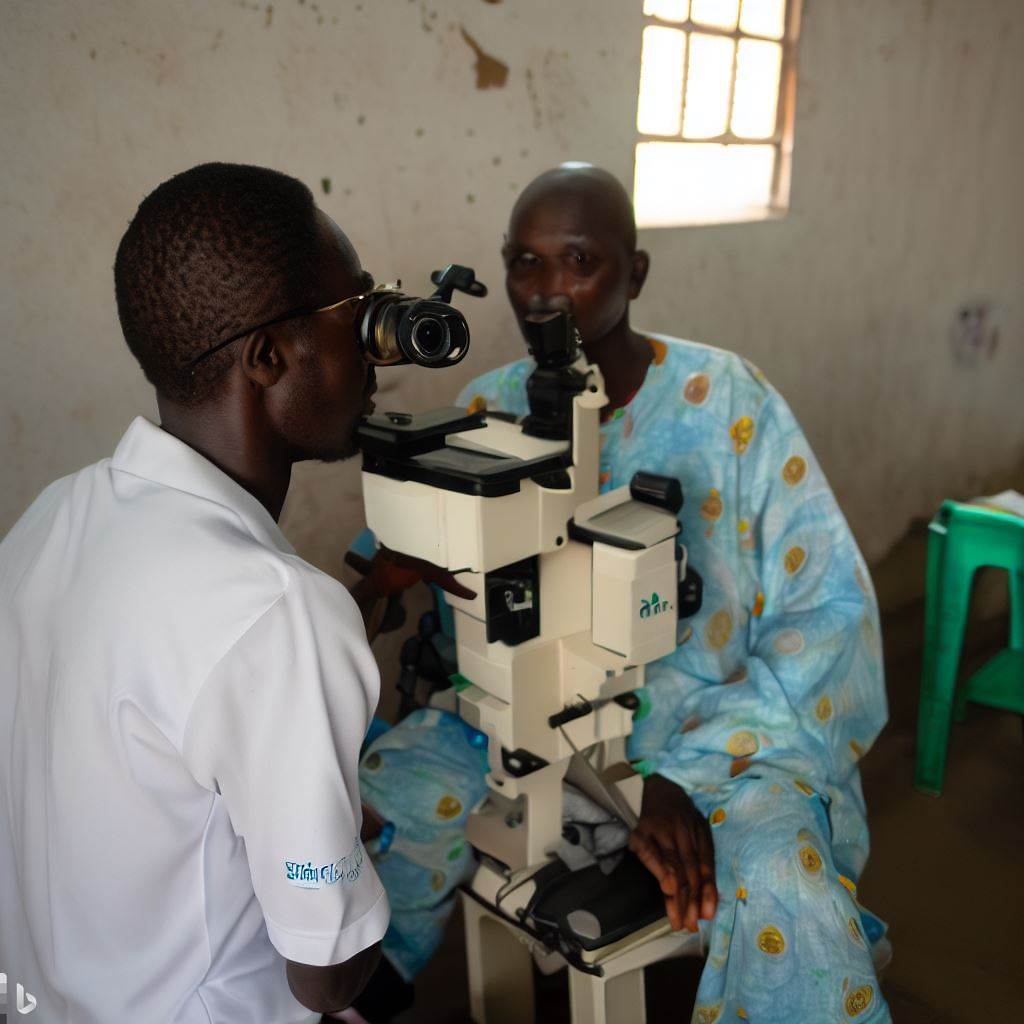Introduction
Speech-language pathologists (SLPs) are professionals who diagnose and treat communication and swallowing disorders.
They play a crucial role in helping individuals with speech and language difficulties improve their communication skills.
In Nigeria, the demand for SLPs is increasing due to the growing awareness of communication disorders and the need for specialized intervention.
Career opportunities for SLPs in Nigeria are diverse and expanding. SLPs can work in various settings such as schools, hospitals, rehabilitation centers, and private practices.
They can also specialize in different areas like pediatric speech therapy, adult speech therapy, or accent modification.
Additionally, SLPs can pursue research and teaching positions in universities and contribute to the advancement of the field.
This blog post will explore the numerous career opportunities that await speech-language pathologists in Nigeria.
It will delve into the specific roles and responsibilities within different settings, as well as the potential for personal and professional growth in this field.
By shedding light on the possibilities available, this post aims to inspire individuals interested in pursuing a career as an SLP in Nigeria.
In review, the role of speech-language pathologists in Nigeria cannot be overstated.
By addressing communication and swallowing difficulties, they contribute to improving the quality of life for individuals across various age groups.
The following sections will provide a comprehensive overview of the career opportunities that await aspiring SLPs in Nigeria.
Overview of Speech-Language Pathology
Speech-Language Pathology, also known as SLP, is a field that focuses on the diagnosis and treatment of communication disorders.
SLPs play a crucial role in helping individuals improve their communication skills.
They work in various settings, such as schools, hospitals, and private practices.
Definition and Scope of Speech-Language Pathology
Speech-Language Pathology refers to the study and treatment of communication disorders.
SLPs assess and treat individuals with speech, language, voice, swallowing, and fluency disorders.
The scope of SLP includes evaluating and diagnosing communication impairments and developing appropriate intervention plans.
Role of SLPs in Diagnosing and Treating Communication Disorders
SLPs conduct thorough assessments to identify the nature and severity of communication disorders.
They use a variety of standardized tests and clinical observations to make accurate diagnoses.
Based on the diagnosis, SLPs develop customized treatment plans to address the specific needs of each individual.
SLPs provide therapy sessions to improve speech articulation, language skills, voice control, and swallowing abilities.
They also work with patients who have fluency disorders, helping them achieve smoother and more fluent speech.
Explanation of the Importance of SLPs in Various Settings
In schools, SLPs support students with communication disorders, enabling them to participate fully in academic and social activities.
They collaborate with teachers and parents to create individualized education plans and provide necessary interventions.
Within hospitals, SLPs assist patients with speech and swallowing difficulties, ensuring safe and effective nutrition and hydration.
SLPs contribute to the rehabilitation of individuals who have suffered from strokes, traumatic brain injuries, or other neurological conditions.
In private practices, SLPs offer specialized services to clients of all ages, improving their communication and overall quality of life.
Speech-Language Pathologists are highly trained professionals who work with individuals across the lifespan.
They strive to enhance communication abilities, promote independence, and maximize individuals’ potential to effectively interact with others.
SLPs play a vital role in addressing communication challenges in Nigeria.
Current State of Speech-Language Pathology in Nigeria
Speech-Language Pathology (SLP) remains an underdeveloped field in Nigeria, largely due to limited awareness and understanding among the population.
SLPs face significant challenges, particularly concerning the lack of resources and funding, hindering the profession’s growth and potential.
The scarcity of awareness regarding speech-language pathology in Nigeria impedes addressing the communication needs of the population.
People are unaware of specialized professionals who can evaluate and treat communication disorders effectively.
Access to critical resources, such as assessment tools, therapeutic materials, and training opportunities, is a major hurdle for SLPs in Nigeria.
These limitations significantly impact their ability to provide effective therapy and support to individuals with communication disorders.
Moreover, the insufficient funding for speech-language pathology services makes it difficult for SLPs to offer affordable and accessible treatment, particularly for those from low-income backgrounds.
However, SLPs play a crucial role in enabling individuals to lead fulfilling lives by addressing communication disorders that can impact their ability to interact and learn.
Raising awareness about speech-language pathology in Nigeria is imperative and can be achieved through community outreach programs, collaborations with other healthcare professionals, and partnerships with educational institutions.
To ensure the advancement of speech-language pathology in Nigeria, the government and stakeholders must recognize its importance and provide necessary support.
Allocating funds for research, training programs, and essential resources for SLPs is vital.
In short, despite the challenges faced, career opportunities for Speech-Language Pathologists in Nigeria hold immense potential to positively impact the communication needs of the population.
Raising awareness, improving resource accessibility, and securing funding are essential steps toward empowering SLPs to serve the Nigerian people effectively.
Career Opportunities for Speech-Language Pathologists in Nigeria
When it comes to career opportunities for speech-language pathologists in Nigeria, there are several avenues to explore.
These opportunities can be found in various sectors, including education, healthcare, private practices, and research.
Let’s take a closer look at the different options available.
Employment opportunities in educational institutions (schools, universities)
Speech-language pathologists can work in schools and universities, helping students with communication and language disorders.
They collaborate with teachers and parents to create individualized treatment plans and provide therapy.
These professionals play a vital role in improving students’ language skills and academic performance.
Opportunities in healthcare settings (hospitals, rehabilitation centers)
Hospitals and rehabilitation centers require speech-language pathologists to work with patients who have speech and swallowing difficulties.
They evaluate patients, diagnose disorders, and provide interventions to improve their communication abilities.
These professionals work as part of a multidisciplinary team to ensure comprehensive care.
Development of private practices and consulting services
There is a growing demand for private speech-language pathologists in Nigeria.
These professionals can establish their own practices and provide services to individuals with communication disorders.
They may also offer consulting services to schools, organizations, and other institutions.
Expanding opportunities in research and academia
Speech-language pathologists have a crucial role to play in advancing research in the field.
They can contribute to the development of effective intervention techniques and strategies.
These professionals can also pursue teaching positions in universities and impart their knowledge to aspiring speech-language pathologists.
In general, the career opportunities for speech-language pathologists in Nigeria are diverse and promising.
Whether working in educational institutions, healthcare settings, private practices, or research and academia, these professionals can make a significant impact on individuals with communication disorders.
With a growing population and increasing awareness about speech-language pathology, the demand for these services is expected to rise.
As a result, speech-language pathologists can look forward to a rewarding and fulfilling career in Nigeria.
Read: Optometry Practices: Rural vs Urban Areas in Nigeria

Importance of Speech-Language Pathologists in Nigeria
Speech-Language Pathologists (SLPs) play a crucial role in improving communication abilities, thereby enhancing individuals’ quality of life, education, and overall well-being in Nigeria.
Due to the increasing demand, there is a pressing need for more professionals in this field.
Discussion of the Impact that SLPs Can Make in Improving Communication Abilities
Speech and language disorders can significantly hinder an individual’s ability to communicate effectively. SLPs are trained professionals who specialize in diagnosing and treating these disorders.
Through tailored therapy programs, SLPs help individuals improve their speech, language, and swallowing abilities.
With the guidance of SLPs, individuals who struggle with speech disorders, such as stuttering or articulation difficulties, can learn techniques to overcome these challenges.
Moreover, SLPs address language disorders, such as expressive and receptive language delays, by providing interventions that enhance vocabulary, grammar, and comprehension skills.
In addition to speech and language disorders, SLPs also work with individuals who have swallowing difficulties.
They assess and develop treatment plans to ensure safe swallowing, preventing potential health complications such as malnutrition and aspiration pneumonia.
Positive Effects on Individuals’ Quality of Life, Education, and Overall Well-being
The impact of SLPs on individuals’ quality of life cannot be understated. Effective communication is essential for personal relationships, academic achievements, and career progression.
Through therapy sessions, SLPs empower individuals, boosting their self-confidence and enabling them to fully participate in social interactions and educational settings.
SLPs also contribute to the educational development of children in Nigeria. By identifying language disorders early on, SLPs play a crucial role in enhancing children’s academic performance.
They collaborate with teachers and parents to create Individualized Education Programs (IEPs) that address specific communication needs, fostering success in the classroom.
Beyond education, SLPs positively impact individuals’ overall well-being.
By improving communication abilities, SLPs help individuals overcome barriers that can lead to social isolation, anxiety, and depression.
They promote inclusion and equal opportunities for individuals with speech and language disorders.
Highlighting the Need for More Professionals in the Field to Meet the Demand
Despite the evident importance of SLPs in Nigeria, there is a shortage of professionals in this field.
The demand for speech-language pathology services outweighs the current supply, leaving many individuals without access to vital interventions.
It is crucial for the Nigerian government and educational institutions to recognize the need for more SLPs and take steps to promote the profession.
This includes offering specialized programs in universities, providing scholarships and incentives for aspiring SLPs, and fostering collaborations between healthcare facilities and educational institutions.
By increasing the number of SLPs, Nigeria can ensure that more individuals receive the necessary support to overcome their communication challenges, ultimately leading to a more inclusive society.
Speech-Language Pathologists have a vital role in Nigeria, as they help individuals improve their communication abilities, positively impacting their quality of life, education, and overall well-being.
The demand for SLPs exceeds the current supply, emphasizing the need for more professionals in this field.
By addressing this shortage, Nigeria can pave the way for a more inclusive and communicatively empowered nation.
Read: Public Perception of the Optometry Profession in Nigeria
Education and Training Requirements
When pursuing a career as a Speech-Language Pathologist (SLP) in Nigeria, it is essential to meet specific education and training requirements.
These requirements ensure that individuals possess the necessary skills and knowledge to provide effective communication therapy and support to those in need.
Overview of the necessary education and qualifications for becoming an SLP:
- Earn a bachelor’s degree: Aspiring SLPs must first complete a bachelor’s degree in Communication Sciences and Disorders or a related field.
- Obtain a master’s degree: Following the undergraduate program, a master’s degree in Speech-Language Pathology is required.
This degree provides in-depth knowledge of speech disorders, language development, and therapeutic techniques. - Clinical practicum: During the master’s program, students undergo clinical practicums that allow them to gain hands-on experience in diagnosing and treating various speech disorders under the guidance of experienced professionals.
- Licensing and certification: After the completion of the master’s program, graduates must obtain a license from the Nigerian Speech-Language and Hearing Association (NSLHA) to practice legally.
Additionally, obtaining certification from the Council for Clinical Certification (CCC) is highly recommended and may enhance career prospects.
Information about relevant degree programs in Nigeria:
Nigeria offers several institutions that provide degree programs in Communication Sciences and Disorders or Speech-Language Pathology, including:
- University of Lagos: Offers a Bachelor of Science in Speech-Language Pathology and a Master of Science degree in Communication Sciences.
- University of Ibadan: Provides a Bachelor of Science in Communication Disorders, a Master of Science in Communication Sciences, and a Ph.D. program in Communication Sciences.
- University of Jos: Offers a Bachelor of Science in Communication Disorders and a Master of Science degree in Communication Disorders.
- University of Benin: Provides a Bachelor of Science in Communication Sciences and a Master of Science in Communication Sciences.
Importance of continuous professional development and staying updated with advancements in the field:
As an SLP, it is crucial to engage in continuous professional development to stay abreast of new developments and advancements in the field.
This ensures that SLPs provide the most effective and evidence-based treatment to their clients. Some ways to achieve this include:
- Attending workshops and conferences: Regularly participating in workshops and conferences allows SLPs to learn about new research, assessment techniques, and therapeutic interventions.
- Continuing education courses: Taking courses that focus on specific areas of speech and language disorders enables SLPs to enhance their skills and expand their knowledge base.
- Reading professional literature: Keeping up with scientific journals and professional publications is vital to stay updated on current best practices and research findings.
- Networking with colleagues: Collaborating and exchanging ideas with fellow SLPs through professional networks and online communities is an excellent way to stay connected and learn from each other.
Generally, becoming an SLP in Nigeria requires completing a bachelor’s degree in Communication Sciences and Disorders, followed by a master’s degree in Speech-Language Pathology.
Gaining practical experience through clinical practicums, obtaining licensing, and considering certification are also essential steps.
Furthermore, engaging in continuous professional development ensures that SLPs remain knowledgeable and up to date with advancements in the field, ultimately providing the highest quality care to individuals with communication disorders.
Read: The Role of Technology in Respiratory Therapy in Nigeria
Challenges and Opportunities for SLPs in Nigeria
Speech-Language Pathologists (SLPs) in Nigeria encounter significant challenges that hinder the profession’s growth.
A primary issue is the lack of public awareness about the role and importance of SLPs in addressing communication disorders. This leads to misconceptions and underutilization of their services.
Moreover, limited resources pose obstacles to SLPs’ effectiveness in providing comprehensive care.
Insufficient funding and access to advanced technology and training restrict their ability to deliver optimal services to individuals with speech and language difficulties.
Despite these challenges, there are promising opportunities for SLPs in Nigeria.
As awareness spreads and recognition of the profession grows, demand for their expertise will likely increase.
SLPs can collaborate with other healthcare professionals and educational institutions to foster a multi-disciplinary approach to communication disorders.
To overcome challenges and promote the profession, several strategies can be employed.
Developing public awareness campaigns and educational programs will help demystify the role of SLPs and showcase the impact they can have on individuals’ lives.
Additionally, advocating for increased funding and support from government and private sectors can enhance the availability of resources and training opportunities for SLPs.
Engaging in research and publications can also elevate the status of the profession and contribute to evidence-based practices.
In the end, SLPs in Nigeria face challenges but are presented with exciting career opportunities.
By addressing awareness gaps, securing resources, and collaborating with other professionals, SLPs can enhance their impact and ensure a brighter future for communication disorders’ treatment in the country.
Read: Overview of the Speech-Language Pathology Profession in Nigeria
Conclusion
Speech-Language Pathologists (SLPs) in Nigeria have numerous career opportunities. They play a vital role in improving communication skills and overall well-being.
The demand for SLPs is high, making it a lucrative career option.
SLPs have a significant impact on individuals with speech and language disorders, helping them regain their ability to communicate effectively.
They work in various settings such as schools, hospitals, clinics, and rehabilitation centers.
The importance of SLPs cannot be underestimated as they provide essential services to children, adults, and the elderly.
They help individuals overcome speech and language difficulties, enhancing their quality of life.
For individuals interested in pursuing a career in speech-language pathology, Nigeria offers a promising prospect.
The field is growing, and there is a need for skilled professionals to meet the demand.
By becoming an SLP, individuals can make a difference in people’s lives and contribute to society.
It is a rewarding profession that allows individuals to positively impact others and foster personal growth.
To enter the field, individuals need to pursue a relevant degree and acquire the necessary certifications. Specializing in specific areas of speech-language pathology can also open up more career opportunities.
In short, a career in speech-language pathology in Nigeria can be fulfilling and economically beneficial.
It is a profession that offers substantial growth potential and allows individuals to make a positive difference in the lives of others.




